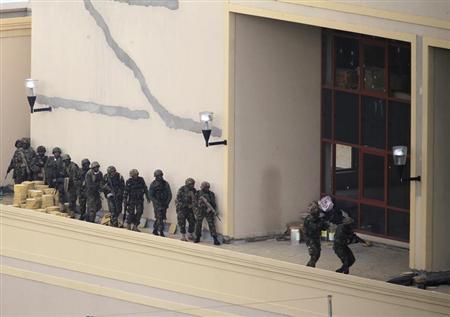(Reuters) – Kenya’s intelligence and security forces will struggle to avert bloody attacks like the one on a shopping mall last month as long as rank-and-file police officers can be easily bribed and rivalry among agencies hinders information sharing.

The assault by a dozen or so Islamist militants on Nairobi’s Westgate mall on September 21 that killed at least 67 people and lasted four days stunned a nation that boasts the most experienced counter-terrorist forces in east Africa.
Yet as investigators sift debris in the wrecked complex for clues to the identities of the assailants and their methods, the broader challenges facing an important ally of Western states in combating Islamist militants are becoming clear.
Past and present security officers, diplomats and experts describe a security apparatus that may be squandering skills built with the help of U.S., British and other trainers because suspects can buy their way through police checks and poor inter-agency coordination means dots are not joined up.
Activists also say the security forces have been too easily drawn into domestic politics rather than policing work.
No one expects Kenya will be able to stop every attack, and Western diplomats praise Kenyan forces for foiling several other plots before the Westgate attackers made it through.
But the Somali Islamist group al Shabaab, which claimed responsibility, has proved its reach and confirmed fears in the West that chaotic Somalia will continue to be a launchpad for attacks. Neighboring Kenya cannot afford to ignore gaps left open by its institutional and personnel shortcomings.
“Irrespective of how much resources you put into intelligence, the corruption will still undermine your objective,” Charles Mwanzia, a retired major-general who ran military intelligence for a decade until 2005, told Reuters.
“It is a bitter lesson and a wake-up call for future improvement of security in this country in terms of intelligence collection and management,” he said of the Westgate attack.
Some of the rivalries that hinder intelligence gathering emerged while the assault on the upmarket mall was under way.
One police investigation officer on the spot, who like others spoke to Reuters on condition of anonymity, described how the crack police General Service Unit Recce force that moved in first to try to flush out the militants was shoved aside within hours when the army sent in troops.
RIVALS VS PARTNERS
The lack of cooperation as the military intervened appeared to give the militants a chance to regroup, possibly prolonging the siege. “The seniors (top ranks in the two forces) did not coordinate,” said the police officer.
The government has said the Westgate operation was handled by several agencies working together. The army responded to such criticism by insisting the police remained in command. The army also said it would investigate accusations that its troops looted the mall while the siege was continuing.
Despite such criticism, security experts and Western diplomats say any security force would have had difficulties inside such a complex against well-trained and armed militants.
But they see failings in the build-up. Experts say Kenya’s intelligence agencies often act more as rivals than partners, refusing to pool data so tips may get missed and pieces in the surveillance puzzle may not be put together.
“They are good at what they do, as far as gathering intelligence … but they do not know what to do with what they have got and how to put together the big picture,” said a security consultant who has worked with east African armed forces and intelligence services.
“I guarantee they are not talking to each other,” he said of the National Intelligence Service, military intelligence and the police investigation department and intelligence units.
Kenya politicians and media have reported clues that were missed. One intelligence document, published in newspapers and obtained by Reuters, but which could not be independently confirmed, listed movements of suspected al Shabaab militants through Kenya in the build-up as well as some indication of warnings that Westgate or a church could be targeted.
Diplomats and veterans say Western security agencies have also tripped up because of poor communication with each other, but such rivalries need to be addressed more urgently in Kenya.
Poor coordination risks squandering Kenya’s wealth of potential sources to track militants, ranging from intelligence from troops deployed with African peacekeepers in Somalia to counter-terrorism forces that get equipment and training from the United States, Britain and other Western states.
Israel has also provided intelligence training and sent advisors to assist Kenya during the siege.
Yet even if intelligence were better coordinated, corruption would still hinder surveillance and tracking of cells. For the equivalent of a few hundred dollars slipped to an officer, a suspect can buy a passport, pass a checkpoint without searches or purchase arms, experts and officers say.
That means, even with the best surveillance, suspects can disappear and leads can go cold.
REACHING THE TARGET
“Kenya is facing a major problem with the middle layer because police are so corrupt,” said one Western diplomat.
“They have been pretty successful at stopping al Shabaab. One was bound to get through,” he said. “What is inexcusable is the very poor showing of the layer (of security) between entering (the country) and reaching the target.”
That makes it harder to infiltrate militant groups or cells, which is vital to halting such operations.
“It takes just one corrupt official for there to be a major intelligence or security breach, for someone to cross a border, for shillings to be slipped into a hand, and someone makes it through,” said another expert on east Africa.
The police force says it encourages the public to report corruption and promises appropriate disciplinary action.
“We cannot say that corruption is not there,” said police spokesperson Gatiria Mboroki, but added: “After you report that allegation it is going to be investigated.”
The former intelligence official said he had once tried to prove to senior colleagues the depth of corruption by bringing his Somali operatives across the border using Kenyan passports he bought on the black market for about $300 each.
“I went to great lengths to prove that closing the Kenyan border was not possible,” he said.
Police reform was one of the priorities in a new 2010 constitution. But, aside from some senior appointments, reform of the force has made limited headway.
“They talk it, but they don’t do anything. It doesn’t need money, it needs an attitude change,” said rights campaigner Maina Kiai. “The intelligence services need to understand that their job is not political, it is security.”
That was echoed by the former intelligence officer, who said the security forces were distracted by the election earlier this year. “The entire security has been more concerned with political intelligence than security intelligence,” he said.
The election of President Uhuru Kenyatta in March showed voting still tends to follow ethnic loyalties, a factor analysts say also seeps into appointments in the services.
The government says officials are chosen on merit, not background. Police spokesperson Mboroki insisted the police force was not swayed by politics but was a “public office”.
Yet activists and experts say more needs to be done.
“Unless there is some mechanism to make them accountable for their actions and some way to root out corruption,” said the security consultant, “there are not going to be any changes.”
(Additional reporting by Matt Mpoke Bigg and Drazen Jorgic; Editing by James Macharia and Paul Taylor)





